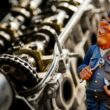Brave new world: When 2025 a lot of the cars "MINTvernetzt" On the basis of model calculations by the automotive supplier Bosch and the consulting firm Prognos for Germany, the USA and China, 260.000 could then be prevented from accidents involving injured persons - due to the fact that many vehicles are connected to the Internet are connected and have certain safety systems on board.
"The hidden heroes of the networked revolution are assistance and comfort systems that we often already know," says Dirk Hoheisel, the responsible Bosch managing director. For example, according to model calculations in the Connected Car Effect 2025 study, ESP antiskid protection will be present in up to 2025 percent of all vehicles in the three countries by 90, sensor-based emergency braking and lane departure warning systems in up to 40 percent of the car population. Systems for more comfort and networking can also be found in the majority of cars: Smartphones will integrate 2025 into the infotainment system in about every second vehicle.
The increasing number of such systems and their increasing connection to the Internet make them more than the sum of their parts - for every road user: ESP sensors will report icy road sections in the future, cameras collect data on speed limits or fog, forklift warnings in near real time are easy Implement way.
According to the study, this has noticeable effects for every car driver: More than 260.000 accidents involving personal injury are then avoided on an annual basis. In Germany 30.000, in the US 210.000, in China 20.000. Some 11.000 human beings could be rescued in the year 2025 by networked assistance systems, of which in Germany 300 (USA: 4.000, China: 7.000). In Germany alone, 37.000 would have fewer injuries due to traffic accidents, in all three countries 360.000 less. In addition, in this country up to 450 million euros less material and damage costs would be incurred through networked assistance systems (total: 4,3 billion euros).
In addition, networked mobility would also have an impact on fuel consumption and emissions: Almost 400.000 tons of CO2 are saved thanks to networked functions - as much as the Black Forest National Park can save in three years. For example, concepts such as community-based parking and active parking management reduce parking search traffic by up to 380 million kilometers, while highly automated driving saves additional fuel.
(Hanne Schweitzer / SP-X)




